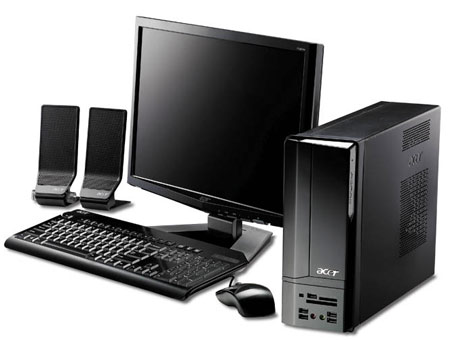Computer Desktop Pictures Biography
Name:Computer Desktop
A desktop computer is a personal computer (PC) in a form intended for regular use at a single location, as opposed to a mobile laptop or portable computer. Early desktop computers are designed to lay flat on the desk, while modern towers stand upright. Most modern desktop computers have separate screens and keyboards.
Prior to the widespread use of microprocessors, a computer that could fit on a desk was considered remarkably small. Early personal computers, like the IBM PC, were "desktop" machines, with a horizontally oriented computer case, usually intended to have the display screen placed on top to save space on the desktop. In modern usage the word "desktop" usually refers to tower cases that are in fact more often located on the floor under the desk than on a desk.
Technically speaking desktop and tower computers are two different styles of computer case that use desk space in varying ways.[original research?] Cases intended for home theater PC systems are usually considered to be desktop cases in both senses, regardless of orientation and placement.
A sophisticated programmable calculator, the HP 9830A was actually an early desktop computer with printer.
Early computers took up the space of a room. Minicomputers generally fit into one or a few refrigerator sized racks. It was not until the 1970s when computers such as the HP 9800 series desktop computers were fully programmable computers that fit entirely on top of a desk. The very first large "programmable calculators/computers" (machines lacking keyboards for text input) were marketed in the second half of the 1960s, starting with Programma 101 (1965)[1] and HP 9100 (1968). More desktop models were introduced in 1971, leading to a model programmable in BASIC in 1972. They used a smaller version of a minicomputer design based on ROM memory and had small one-line LED alphanumeric displays. They could draw computer graphics with a plotter. The Wang 2200 of 1973 led operating systems such as Mac All-in-one Computers are desktop computers that combine the computer's internal components into the same case as the monitor. Apple has manufactured several popular examples of all-in-one computers, such as the original Macintosh of the mid-1980s and the iMac of the late 1990s and 2000s. Some older 8-bit computers, such as the Commodore PET 2001 or Kaypro II, also fit into this category. All-in-one PCs are typically more portable than other desktop PCs and many have been built with carrying handles integrated into the case. They can simply be unplugged and transported to a new location.Like laptops, all-in-one desktop computers are characterized by a comparative lack of upgradeability or hardware customization, as internal hardware is often placed in the back of the visual display unit. Furthermore, in the case of the iMac line since 2002, the CPU and other internal hardware units are, more or less, permanently attached to the motherboard due to space constraints.However, newer models of all-in-one computers have changed their approach to this issue. Many of the current manufacturers are using standard off-the-shelf components and are designing upgrade convenience into their products.Some all-in-one computer have TouchScreen controllers integrated into the visual display unit.
Computer Desktop Pictures

Computer Desktop Pictures

Computer Desktop Pictures
Computer Desktop Pictures

Computer Desktop Pictures

Computer Desktop Pictures

Computer Desktop Pictures

Computer Desktop Pictures

Computer Desktop Pictures
Computer Desktop Pictures

Computer Desktop Pictures

Computer Desktop Pictures

Computer Desktop Pictures


No comments:
Post a Comment